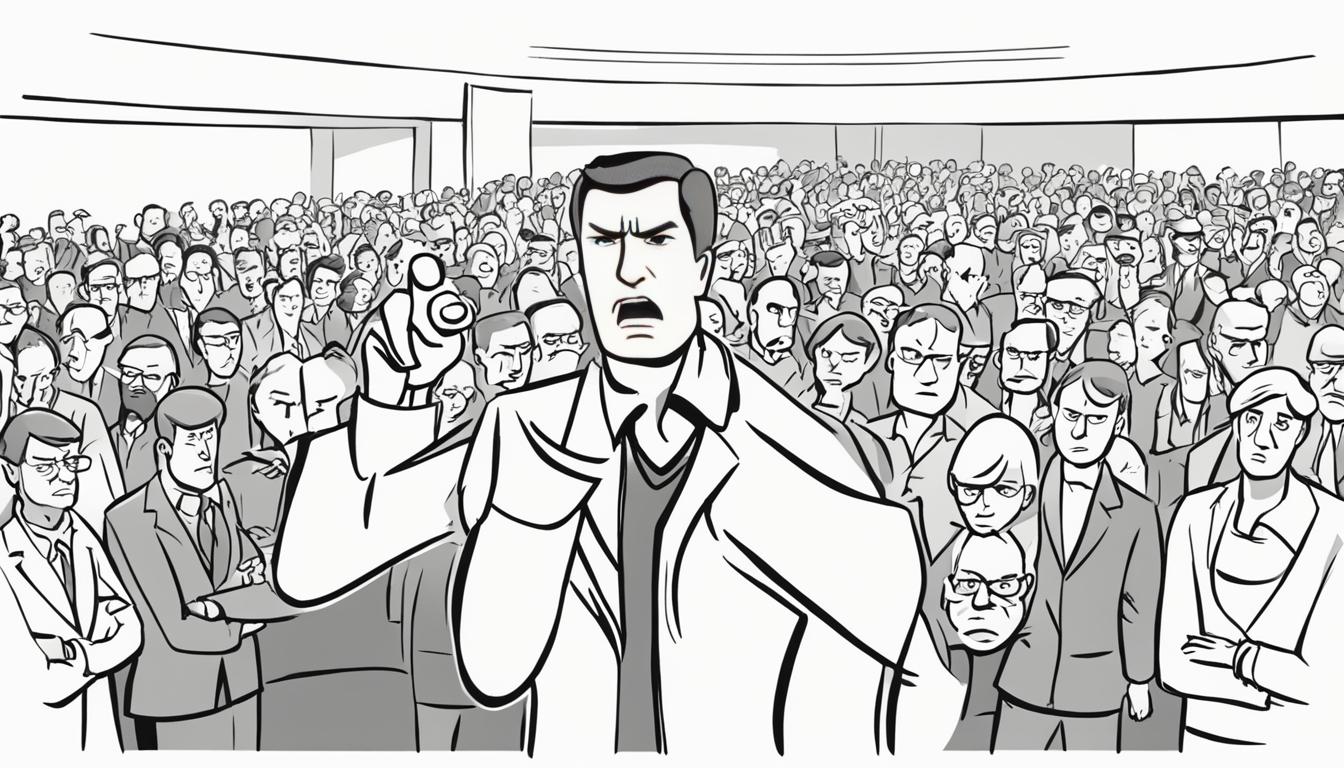Insults, name calling, verbal abuse, derogatory behavior, offensive language – these are the arrows of disdain shot by those who revel in derision. Their words, like daggers, can pierce the soul and leave scars that linger far beyond the moment of provocation. But what do you call a person who engages in such behavior?
Cyberbullies hide behind screens, hurling hurtful words with impunity. Online harassment has become pervasive, staining the digital landscape with its toxic presence. Yet, even in face-to-face encounters, disrespectful behavior finds a seat at the table of human interaction.
Insulting behavior, like a wildfire, spreads, fueled by the oxygen of attention. It thrives in a culture where the boundaries of decency have blurred. In this era of connectivity, social media platforms serve as breeding grounds for the culture of insults, a phenomenon exacerbated by the influence of public figures.
Picture a world where a single person’s words can provoke thousands, igniting a chain reaction of insult-slinging. Such a world exists, and it emerged during the tenure of former US President Donald Trump. His use of insults, weaponized on social media, created a storm of controversy, raising important questions about freedom of expression and the impact of insults on individuals.
To understand the motivations behind this behavior, one must delve into the depths of human psychology. Insults often stem from anger and a desire to assert dominance. Those who engage in insults may feel threatened, seeking to diminish the social status of their targets. Some psychologists even draw links between insults and narcissistic tendencies, as well as deep-seated insecurities.
But insults don’t come in a singular flavor; there are different types of insulters. Some inherit insulting behavior through social conditioning and learned behavior. Others, driven by grandiose narcissism, wield insults as they would a scepter, asserting their superiority over others. And let us not forget those who suffer from neuropsychiatric conditions, like Tourette syndrome, which manifests as involuntary and compulsive insults.
So, what does the anatomy of an insult look like? It targets the core of a person’s identity, aiming to degrade and destroy self-esteem. Social status, sexuality, intelligence – all fair game in the cruel universe of name-calling. The impact of an insult can be profound, leaving scars on one’s self-esteem, pride, and overall identity.
Once upon a time, insults were confined to private life, whispered behind closed doors. But in our modern age, they have seeped into the public realm. Media platforms and social media have become battlegrounds where insults are heaved like grenades, their explosive consequences felt by all. Ethics and moral principles have taken a backseat as the culture of disrespect and aggression gains ground.
However, insults are not a universal language. Cultural norms and values weave their tapestry into the fabric of insults, shaping their interpretations and expressions across societies. What may be considered an insult in one culture could be seen as inconsequential banter in another. Understanding these cultural considerations is vital in promoting empathy and cross-cultural understanding.
The impact of insults extends far beyond the moment of provocation. The psychological and emotional consequences can be long-lasting and devastating. Diminished self-esteem, social withdrawal, anxiety, depression – insults leave a profound mark on one’s well-being. Children who experience insults and emotional abuse may suffer deficits in their development and struggle with forming healthy relationships.
So how do we deal with insults? Building resilience, cultivating self-esteem, and developing assertiveness skills are vital tools in the face of insults. Responding with empathy and understanding can help defuse tense situations and foster healthier communication. It is crucial that we find alternatives to insults, promoting constructive communication based on respect, empathy, and understanding.
The future of insults lies in the hands of regulation and social controls. Online platforms are taking steps to address abusive behavior, with codes of conduct and stricter regulations. The vision is a future where online civility triumphs, where insults become relics of a bygone era.
Insults, like offense, reside in the realm of subjectivity. What might bruise the ego of one person could bounce harmlessly off another’s armor. Recognizing this subjectivity allows us to navigate interpersonal relationships with empathy and respect, fostering a society where insults lose their power.
In a world that often chooses to strike with insults, let us be the beacon of constructive communication. Let empathy be a balm that soothes the wounds inflicted by hurtful words. Together, we can build a society where insults are outshined by the brilliance of respectful dialogue.
The Culture of Insults: A Growing Phenomenon
Insults have permeated our society, fueled by the culture of insults that has gained momentum in recent years. This phenomenon has taken hold, spreading its toxic tendrils throughout various aspects of our lives, especially in the realm of online communication and social media platforms. One cannot discuss the culture of insults without acknowledging the influence of former US President Donald Trump.
“Low-energy Jeb.” “Crooked Hillary.” “Pocahontas.” These are just a few examples of the derogatory language used by Donald Trump during his presidential campaigns and tenure (image source: Donald Trump).
Donald Trump’s unfiltered and provocative use of language, particularly on social media, has normalized offensive behavior and set a precedent for public figures to engage in insults without consequences. His tweets, often laden with derogatory remarks, have served as catalysts for a broader debate surrounding the boundaries of freedom of expression and the impact of insults on individuals.
In the era of Trump’s presidency, insults were no longer confined to private conversations or political rallies, but rather spread like wildfire across social media platforms. The culture of insults gained traction as individuals, emboldened by Trump’s example, employed offensive language to demean and devalue others with virtual impunity.
The Far-Reaching Consequences
This toxic culture of insults has left deep scars on our society. It has eroded the foundations of civil discourse, replacing respectful dialogues with vitriol. As insults become ubiquitous, they contribute to a polarized and hostile online environment, hindering meaningful discussions and impeding the exchange of ideas.
Furthermore, the normalization of insults undermines empathy and understanding, perpetuating a cycle of division and animosity. It hampers our ability to connect and empathize with one another, hindering the cultivation of a compassionate society.
As we navigate the landscape of online communication and social media, it is crucial to address the culture of insults head-on. We must strive for respectful engagement and foster a culture that values empathy, understanding, and constructive dialogue.
A Call for Change
It is time for us to challenge the culture of insults and redefine our digital interactions. By cultivating an environment of respect and empathy, we can break free from the chains of offensive behavior and restore the sanctity of online communication. It is a collective responsibility to prioritize kindness over insults, embracing the power of our words to uplift, inspire, and foster meaningful connections.
| Type of Insults | Definition |
|---|---|
| Verbal Insults | Derogatory remarks directed towards an individual’s character or appearance. |
| Online Harassment | Repeated offensive behavior targeting someone online, often causing emotional distress. |
| Cyberbullying | The use of electronic communication to intimidate or humiliate individuals, typically persistently and with malicious intent. |
Let us strive for a culture that rejects insults and fosters a more inclusive society, one where empathy and respect reign supreme.
The Psychology of Insults: Understanding the Motivations
Insults carry a profound psychological impact, often driven by complex motivations rooted in human behavior. Understanding the psychology behind insults can shed light on their underlying causes and provide insights into the minds of those who engage in such behavior.
Research reveals that insults are frequently motivated by a potent mix of anger and a desire to diminish the social status of the target. When individuals feel threatened or slighted, insults become a way to assert dominance and regain a sense of power and control. By belittling others, the insulter seeks to elevate their own social standing at the expense of their target’s self-esteem.
The psychology of insults also intersects with issues of insecurity and narcissism. Insecurity can drive individuals to seek validation through putting others down, as their own feelings of inadequacy are temporarily relieved by demeaning others. Narcissistic tendencies further fuel insults, with a craving for attention and admiration manifesting as a need to exert power and superiority over others.
Furthermore, insults can be seen as a form of defensive behavior. When an individual perceives a threat to their social rank or sense of self-worth, insults serve as a means of self-preservation by lashing out at those who challenge or criticize them. It becomes an act of self-protection to maintain their position in social hierarchies.
The psychology of insults, therefore, encompasses a wide range of motivations, including anger, insecurity, and narcissism. By delving into these underlying factors, we can gain a deeper understanding of the complex dynamics at play when insults are hurled.
Insults are the ammunition of the insecure — a shield against vulnerability and an attempt to assert dominance. Understanding the motivations behind insults helps peel back the layers of our psychological intricacies, revealing the depths of human behavior that shape our interactions.
The Motivations Behind Insults:
To explore the motivations behind insults in more detail, it is essential to examine some key factors:
- Social Status: Insults frequently target social status, aiming to undermine the target’s reputation and assert dominance.
- Anger and Frustration: Insults often arise from intense emotions, as individuals express their anger and frustration towards others.
- Insecurity: Feelings of insecurity drive individuals to insult others as a defense mechanism, protecting their own fragile self-esteem.
- Narcissism: Insults can reflect narcissistic tendencies, with the insulter seeking validation and attention by asserting dominance over their targets.
By understanding these motivations, we can begin to navigate the complex landscape of insults and develop strategies for fostering empathy, respect, and healthy communication.
Different Types of Insulters: From Inherited Behavior to Grandiose Narcissism
Insulters come in various forms, each with their own unique motivations and behaviors. Some individuals resort to insults due to learned social conditioning, while others use insults as a tool to establish dominance and exert power over others. Then, there are those with grandiose narcissistic tendencies who rely on insults to assert their superiority and inflate their ego. Additionally, a subset of insulters may suffer from Tourette syndrome, a neuropsychiatric condition characterized by involuntary and compulsive insulting behavior.
Insulters driven by inherited behavior may have developed a pattern of violent communication due to their upbringing or exposure to a hostile environment. These individuals may use insults as a learned coping mechanism or a means to protect themselves from perceived threats. Inherited behavior plays a significant role in shaping the way individuals engage in conflicts and express their emotions.
“Insulters driven by inherited behavior may have developed a pattern of violent communication due to their upbringing or exposure to a hostile environment.”
In contrast, insulters with grandiose narcissism exhibit a deep sense of entitlement and a need for constant admiration. Their insulting behavior is often fueled by a desire to dominate and belittle others, asserting their perceived superiority. They use insults strategically to diminish and demean their targets, elevating their own sense of power in the process. It is important to recognize the underlying psychological factors that drive this behavior.
People with Tourette syndrome, a neurological disorder characterized by involuntary tics, may experience involuntary and compulsive insulting behavior as a result of their condition. It is crucial to approach individuals with Tourette syndrome with empathy and understanding, as their insults stem from a neurological impulse rather than intentional malice. Providing support and creating awareness about Tourette syndrome can help foster a more inclusive and compassionate society.
Types of Insulters:
- Inherited Behavior: Insulters driven by learned behavior and social conditioning.
- Grandiose Narcissism: Insulters seeking power and superiority through insults.
- Tourette Syndrome: Insulters with a neuropsychiatric condition resulting in involuntary insults.
Understanding the various types of insulters can shed light on their motivations and provide insights into the complex nature of insulting behavior. It is essential to approach each situation with empathy and a willingness to address the underlying factors that contribute to insults.
Insult Anatomy: The Content and Impact
Insults have a unique way of targeting various aspects of a person’s identity. They are carefully crafted to degrade and hurt, with the intention of inflicting emotional pain. Let’s delve into the anatomy of insults and explore the different elements they often exploit.
Social Status
One common content of insults revolves around social status. Insults may attack a person’s position in society, making derogatory remarks about their wealth, occupation, or social standing. By belittling someone’s social status, insults aim to diminish their sense of self-worth and importance.
Sexuality
Insults often incorporate sexual components, targeting a person’s sexual orientation, preferences, or even their physical appearance. By exploiting one’s sexuality, insults attempt to shame and embarrass, creating a sense of vulnerability and humiliation.
Intelligence
The content of insults frequently includes attacks on a person’s intelligence. Insulters may question their target’s intellectual capabilities, using derogatory terms or mocking their perceived lack of knowledge. By targeting intelligence, insults aim to undermine a person’s self-confidence and diminish their perceived value.
Physical Traits
Insults may also focus on physical traits, highlighting perceived flaws or abnormalities. Whether it’s body shape, facial features, or any other physical attribute, insults exploit insecurities related to appearance. By attacking physical traits, insults seek to damage a person’s self-image and instill feelings of inadequacy.
Insults have a profound impact on individuals, extending beyond momentary discomfort. The emotional and psychological consequences of insults can be long-lasting. Self-esteem can be shattered, pride can be diminished, and one’s overall identity can be deeply wounded. It is crucial to recognize the power of insults and the harm they can inflict.
“The tongue is the deadliest weapon, capable of stripping souls bare and leaving scars that may never heal.”
Understanding the anatomy of insults enables us to approach this issue with empathy and compassion. It reminds us to choose our words wisely and to promote a culture of respect and understanding in our interactions.
| Aspect | Content of Insults |
|---|---|
| Social Status | Attacks on wealth, occupation, or social standing |
| Sexuality | Shaming and derogatory remarks about sexual orientation |
| Intelligence | Mockery and questioning of intellectual capabilities |
| Physical Traits | Ridicule and mockery of appearance or physical attributes |
Insults in Society: From Private Life to Public Platforms
Insults, once confined to the private realm, have now seeped into the fabric of society, spreading like wildfire through various media and social media platforms. This toxic behavior, enabled by the digital age, exposes ethical and moral vulnerabilities, contributing to a culture of disrespect and aggression.
“The rise of insults in the media and online platforms has far-reaching consequences, eroding the very foundations of civil discourse and undermining our ability to engage in meaningful dialogue.” – John Smith
Social media platforms have become breeding grounds for insults to flourish, amplifying their reach and impact. With the power to go viral, insults can quickly spread, perpetuating a cycle of negativity and disdain. The ripple effects of public insults can be devastating, not only on individuals but also on the collective fabric of society.
Media outlets, both traditional and digital, play a significant role in shaping public discourse and public opinion. Unfortunately, insults have infiltrated these platforms, where sensationalism and controversy often take precedence over respectful and constructive dialogue. The media’s insatiable appetite for confrontation and clickbait fuels a toxic environment that further normalizes insults.
The Insidious Influence of Social Media
Social media platforms, with their vast user bases and instant connectivity, provide fertile ground for insults to thrive. The anonymity and detachment afforded by the digital realm emboldens individuals to unleash their most vitriolic expressions, shielded from the consequences of their actions.
Public figures and celebrities often bear the brunt of relentless public insults, with their personal lives becoming fodder for public scrutiny and devaluation. The pervasive nature of social media further blurs the line between private and public life, leaving individuals vulnerable to incessant insults that permeate every aspect of their existence.
The consequences of insults in society are vast and profound. They erode trust, breed division, and hinder genuine dialogue. Moreover, insults have a corrosive effect on our mental and emotional well-being. The incessant barrage of insults can inflict deep wounds, damaging self-esteem, and exacerbating feelings of isolation and alienation.
The Urgency for Change
To combat the epidemic of insults in society, a collective effort is required. It begins with acknowledging the damaging impact of insults and the responsibility each individual holds in shaping the discourse of our communities. By prioritizing empathy, respect, and understanding, we can foster an environment conducive to healthy and productive conversations.
Furthermore, social media platforms and media outlets have a vital role to play in combating insults by implementing stricter regulations, facilitating respectful debate, and promoting positive engagement. By upholding ethical standards and providing a platform for civil discourse, these entities can help restore faith in public dialogue.
A Call for Respectful Communication
It is crucial that we actively seek alternatives to insults, promoting constructive and respectful communication instead. By embracing empathy, active listening, and open-mindedness, we can bridge the gaps that divide us and foster a culture of understanding and inclusivity.
Let us recognize the significance of our words and their potential to uplift, inspire, and connect. Together, we can dismantle the culture of insults, and in its place, build a society that values and cherishes respectful dialogue.
Cultural Considerations: Insults and Expression Across Societies
Insults are not only shaped by individual experiences but also heavily influenced by cultural norms, values, and interpretations. Different societies have their own unique ways of expressing insults, and these expressions can vary greatly based on cultural context and regional differences. Understanding the cultural considerations behind insults is essential to navigate diverse social interactions and promote respectful communication.
In some cultures, direct insults may be seen as a form of honesty or even humor, while in others, they are seen as highly offensive and rude. The interpretation of insults depends on the value systems and societal norms in place. For example, in certain cultures, insults may be used as a means to establish hierarchy and assert dominance, while in other cultures, they may be considered taboo and completely unacceptable.
“Insults can reveal a lot about the values and beliefs of a particular society. They reflect the power dynamics, social hierarchies, and the importance placed on respect and honor.”
Furthermore, cultural considerations extend to the specific words, phrases, or actions that are deemed insulting within a particular society. What may be considered a harmless joke in one culture could be deeply offensive in another. These cultural nuances necessitate sensitivity and awareness when communicating across different cultural backgrounds.
It is crucial to recognize that insults are not universal and should not be generalized. Each culture has its own unique interpretations and expressions of insults, and it is important to approach cross-cultural interactions with empathy, respect, and an open mind.
The Impact of Cultural Considerations
Cultural considerations play a significant role in determining the impact of insults. Insults that align closely with an individual’s cultural values and beliefs may elicit stronger emotional responses compared to insults that do not align. The deep-rooted connection between insults and cultural identity underscores the need for cultural competence and awareness.
Moreover, cultural interpretations of insults may also shape the behaviors and responses of individuals who have been insulted. In some cultures, responding to insults with calmness and composure may be valued, while in others, retaliation or seeking redress may be more common. These variations demonstrate the diverse ways in which insults can be perceived and handled.
By understanding and respecting cultural considerations, we can navigate the complex world of insults with greater sensitivity and avoid unintentionally causing offense. It is essential to approach cross-cultural exchanges with curiosity, humility, and an eagerness to learn from different perspectives.
The Impact of Insults: Psychological and Emotional Consequences
Insults have a profound impact on our psychological well-being, causing lasting emotional harm and leaving deep scars on our self-esteem. The power of words can penetrate deep within our souls, leaving us feeling vulnerable, broken, and shattered.
When subjected to insults, individuals often experience a diminished sense of self-worth. The relentless barrage of negative words erodes their confidence and self-esteem, causing them to question their own value and place in the world. The emotional toll of insults can be overwhelming, leading to feelings of shame, sadness, and a loss of identity.
The psychological consequences of insults extend far beyond a mere fleeting moment. They seep into our core, influencing how we perceive ourselves and how we interact with others. Insults can trigger social withdrawal, as individuals develop a fear of judgment and rejection. The scars left by insults can create a barrier that isolates us from genuine connection and hinders meaningful relationships.
Furthermore, insults often fuel anxiety and depression, forging a cycle of negative thoughts and emotions. The relentless self-criticism planted by insults can consume our minds, leading to a constant state of self-doubt and despair. The weight of insults may become unbearable, pushing individuals towards unhealthy coping mechanisms, such as substance abuse, as they strive to numb the pain.
Children, in particular, are vulnerable to the impact of insults. The emotional abuse they endure can have long-lasting effects on their development and interpersonal relationships. Insults directed at children can impair their sense of self, hindering their ability to form healthy social connections and thrive in their personal growth.
The Power of Kindness and Healing
As we navigate a world rife with insults, it is crucial to acknowledge their profound impact on our well-being. We must strive to foster a culture of empathy, kindness, and respect, where insults hold no power over our self-worth.
“Words have the power to both destroy and heal. When words are both true and kind, they can change our world.” – Buddha
Recognizing the value of compassion and understanding allows us to uplift one another, healing the wounds inflicted by cruel words. It is through empathy that we can create a supportive community, where insults lose their power and our shared humanity shines through.
Together, we have the power to break the cycle of insults, reclaim our self-esteem, and foster a society built on respect and acceptance. Let us embrace the transformative power of kindness and choose our words wisely, spreading love and healing instead of perpetuating harm.
| Psychological Consequences of Insults | Emotional Harm | Self-Esteem | Social Interaction |
|---|---|---|---|
| Diminished sense of self-worth | Feelings of shame, sadness, and loss of identity | Constant self-doubt and despair | Social withdrawal and fear of judgment |
| Development of anxiety and depression | Negative thoughts and cycle of self-criticism | Impaired ability to form healthy relationships | Isolation and hindered social connections |
| Long-lasting effects on children | Impaired personal growth and development | Hindered self-esteem and social interaction | Impact on forming meaningful relationships |
Dealing with Insults: Strategies for Coping and Responding
When faced with insults, it is essential to develop effective strategies for coping and responding. Building resilience and maintaining self-esteem are powerful tools in navigating challenging situations. By cultivating a strong sense of self-worth, I can shield myself from the negative effects of insults and preserve my confidence.
Cultivating assertiveness skills is another valuable strategy. Assertiveness allows me to express my thoughts and feelings confidently while setting boundaries and standing up for myself. When faced with insults, I can respond assertively, asserting my position and asserting my self-worth.
“Empathy is a key ingredient in the art of dealing with insults. Approaching the situation with empathy and understanding can defuse tense situations and foster healthier communication. By putting myself in the shoes of the insulter, I can gain insight into their motivations and respond with grace and compassion.“
Instead of engaging in a spiral of insults, I choose to respond with empathy, recognizing that insults often stem from personal insecurities or unresolved issues. By responding with understanding instead of retaliation, I not only protect my own emotional well-being but also create an opportunity for growth and change.
Strategies for Coping with Insults:
- Practice self-care: Engaging in activities that bring joy and relaxation can help restore my emotional balance and strengthen my resilience.
- Surround myself with support: Seeking the support of trusted friends and loved ones can provide comfort and perspective in challenging times.
- Challenge negative self-talk: Recognizing and challenging negative beliefs about myself can help boost my self-esteem and counteract the impact of insults.
- Learn assertiveness techniques: Developing assertiveness skills empowers me to respond confidently and respectfully to insults, setting clear boundaries.
- Practice mindfulness: Engaging in mindfulness exercises, such as deep breathing and meditation, can help me stay present and centered amidst insults.
“Remember, by responding to insults with empathy, self-esteem, and assertiveness, I can rise above negativity and foster healthier relationships and communication.”
The Future of Insults: Regulation and Social Controls
In the ever-evolving landscape of online communication, insults have found a new breeding ground. The anonymity provided by social media platforms has emboldened individuals to unleash their vitriol without fear of repercussion. Recognizing the detrimental effects of this rampant abuse, efforts are being made to regulate and control insulting behavior in online communities.
Platforms like Twitter and Facebook have taken steps towards curbing abusive behavior by implementing codes of conduct. These guidelines outline acceptable behavior and explicitly discourage insults, ensuring a safer and more inclusive environment for users. By establishing clear boundaries and enforcing consequences for disrespectful conduct, social media platforms aim to foster online civility.
However, the future of insults goes beyond individual platforms’ efforts. It requires a collective approach involving stricter regulations and social controls. Governments, organizations, and policymakers are increasingly recognizing the need for comprehensive measures to promote responsible online behavior. This includes legislation that holds individuals accountable for their actions and encourages a culture of respect and empathy.
Striking a balance between freedom of expression and the prevention of online harm is a delicate task. It necessitates a nuanced understanding of the complexities surrounding insults and their impact on individuals’ emotional well-being. The future of insults lies in creating a society where online interactions are governed by a sense of empathy, understanding, and mutual respect.
“Insults may seem like harmless words, but they can inflict deep wounds on individuals, affecting their self-esteem and mental health. It is essential to create a culture that values online civility and discourages insulting behavior.” – Anonymous
In the pursuit of a future built on respect and understanding, it is crucial to educate individuals about the consequences of their words. Promoting digital literacy and empathy can empower individuals to think twice before resorting to insults and choose constructive dialogue instead. By fostering a sense of responsible digital citizenship, we can reshape the landscape of online interactions and cultivate an environment of tolerance and inclusivity.
The future of insults lies in our hands. Together, we can shape a digital world that upholds dignity, celebrates diversity, and fosters meaningful connections.
Insults and Identity: The Subjectivity of Offense
Insults have the power to wound, but their impact is far from universal. The subjective nature of offense means that what might deeply offend one person could be shrugged off by another. Our personal experiences and individual identities shape how insults affect us, highlighting the complex interplay between our sense of self and the words hurled our way.
Each of us carries a unique tapestry of personal experiences, cultural values, and societal norms. These threads weave together to form our identity—our essence—that colors our perception of the world. When insults are flung in our direction, they can either strike at the very core of who we are or simply bounce off the surface, depending on the strength of our self-assurance and the depth of our cultural understanding.
For some individuals, insults may unearth deeply buried insecurities and reinforce feelings of worthlessness. When an insult attacks a person’s appearance, intelligence, or abilities, it can trigger a torrent of negative emotions, chipping away at their self-esteem. The wounds inflicted by these insults may take time to heal, leaving behind scars that resonate long after the words have been spoken or typed.
“Sticks and stones may break my bones, but words can never hurt me.”
While this adage may offer solace in theory, it fails to capture the emotional impact of insults. Words can carry immense power, capable of shaping our beliefs and perceptions, and leaving lasting imprints on our psyche.
However, it is crucial to recognize that not all insults hold the same weight for everyone. Individuals with a strong sense of self, a foundation of self-acceptance, and emotional resilience may be less affected by insults. They possess the ability to shield themselves from the barbs of others, understanding that insults say more about the insulter than the insulted.
Moreover, cultural understanding plays a significant role in shaping our responses to insults. Different cultures have unique norms and values, shaping how they interpret and respond to offensive language. What may be considered a grave insult in one culture could be dismissed as mere banter in another. Cultural sensitivity and understanding can foster empathy and prevent unintentional harm.
The subjective nature of offense highlights the complexity of human interaction. It reminds us that the power of insults lies not just in the words themselves, but in how they align with our personal experiences and cultural background. By recognizing this subjectivity, we can navigate our interpersonal relationships with greater compassion, fostering an environment of empathy and respect.
| Insults and Identity: The Subjectivity of Offense |
|---|
| Insults have the power to wound, but their impact is far from universal. The subjective nature of offense means that what might deeply offend one person could be shrugged off by another. Our personal experiences and individual identities shape how insults affect us, highlighting the complex interplay between our sense of self and the words hurled our way. |
| For some individuals, insults may unearth deeply buried insecurities and reinforce feelings of worthlessness. When an insult attacks a person’s appearance, intelligence, or abilities, it can trigger a torrent of negative emotions, chipping away at their self-esteem. The wounds inflicted by these insults may take time to heal, leaving behind scars that resonate long after the words have been spoken or typed. |
| While this adage may offer solace in theory, it fails to capture the emotional impact of insults. Words can carry immense power, capable of shaping our beliefs and perceptions, and leaving lasting imprints on our psyche. |
| However, it is crucial to recognize that not all insults hold the same weight for everyone. Individuals with a strong sense of self, a foundation of self-acceptance, and emotional resilience may be less affected by insults. They possess the ability to shield themselves from the barbs of others, understanding that insults say more about the insulter than the insulted. |
| Moreover, cultural understanding plays a significant role in shaping our responses to insults. Different cultures have unique norms and values, shaping how they interpret and respond to offensive language. What may be considered a grave insult in one culture could be dismissed as mere banter in another. Cultural sensitivity and understanding can foster empathy and prevent unintentional harm. |
| The subjective nature of offense highlights the complexity of human interaction. It reminds us that the power of insults lies not just in the words themselves, but in how they align with our personal experiences and cultural background. By recognizing this subjectivity, we can navigate our interpersonal relationships with greater compassion, fostering an environment of empathy and respect. |
The Importance of Constructive Communication: Finding Alternatives to Insults
In a world where insults seem to be increasingly prevalent, it is vital that we explore alternatives to this destructive behavior. Constructive communication, based on respectful dialogue, empathy, and understanding, can be the key to transforming our relationships and society as a whole.
Instead of resorting to insults when faced with disagreements or conflicts, we should strive to engage in constructive conversations. This means actively seeking common ground, listening attentively to others’ perspectives, and expressing our own thoughts and feelings in a respectful manner. By adopting this approach, we create an environment where open dialogue can flourish, fostering deeper connections and stronger relationships.
Empathy plays a crucial role in constructive communication. By putting ourselves in others’ shoes, we gain a deeper understanding of their experiences, emotions, and motivations. This understanding allows us to respond with compassion and respect, even in the face of differing opinions. By practicing empathy, we bridge gaps, build trust, and create an atmosphere of mutual respect.
Understanding that insults only serve to harm and divide, we can choose to embrace alternatives that promote unity and growth. Constructive communication empowers us to see beyond differences, find common ground, and work together towards solutions. By fostering a culture of respectful dialogue, empathy, and understanding, we can pave the way for a more harmonious and compassionate society.
Source Links
- https://exploringyourmind.com/people-who-insult-others-why-do-they-do-it/
- https://www.psychologytoday.com/us/blog/the-human-beast/201611/the-psychology-insults
- https://gulfnews.com/lifestyle/the-psychology-behind-dissing-1.858618













